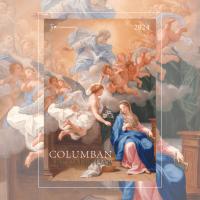The presence of refugees among us is a challenge to listen to a wisdom gleaned from a situation unlike our own.

Justice for Refugees Palm Sunday Rally in Melbourne. Photo: St Columbans Mission Society
The continuous flow of accusations against politicians for abuse of their position or expense accounts may prove a disheartening characteristic of Australia’s democratic system to some, but to one man from a radically different background, it can be a breath of fresh air.
“I love reading these reports,” Denzel (not his real name), says.
Denzel finds them refreshing and rather than indicating malfunction, he sees a functioning system of checks and balances. “It shows a political system that is working, as it is being understood as something that exists to serve the public interest, not something for personal gain.”
Denzel is in Australia on a bridging visa while his claim for asylum is being processed. He explains that in his country of origin, politics are not like that. “A political position is seen as a shortcut to personal wealth,” he says. “There is no concept of public service. That identity simply does not exist.”
While his homeland has all the trappings of a democratic state, replete with universal suffrage, a judicial system, public service institutions, a parliament and the trimmings of free speech, Denzel says it does not work. Why? “There is no accountability. No one is ever held accountable,” he explains, “even though people do initiate processes, they fizzle out, as those responsible are not interested in following them up.”
He points out that growing up in this environment can make it seem normal, as he had no exposure to any other way, but as a graduate from university he was offered an opportunity to study in Europe, where he experienced a different reality.
“When I returned home, I wanted to do something about it. I began to see the poverty around me with clearer eyes and I saw it expanding, not contracting, especially for women and children. I determined that I would do whatever I could to change this.”
While some may say he was becoming a victim of his own goodness, he simply says that the struggle for good is universal and is incumbent upon all, especially those who like himself, had been privileged with education and the experience of something far more constructive.
A man without the skills of a street organiser or mass orator, Denzel determined to use what he did possess, his education, to try and make a difference. “The only battle I could wage was an intellectual war. So I began a thinktank, a non-government organisation to sow the seeds of what I had learned about community organisation and social development overseas.”
A teaching job at a university was an essential part of his campaign. “I tried to open the eyes of the young about what was happening,” he explains, not so much by being the sage on the stage, but more the guide on the side cajoling the students to describe what they saw and experienced in their own lives and conceptualise this against what they believed could be happening.
That was when things began to go badly. The crackdown came, first with an enticement to join a political party and be sucked into the domesticating swamp. He refused. Then his teaching contract was terminated.
“I was told it was because of financial restraints,” he says, “but I knew the university had plenty of money because it had just received generous grants from overseas. I could not understand the decision at first.”
But next, there were personal attacks, firstly threats—some verbal, but then physical. “I was assaulted at street rallies,” he explains, “and began to see the hopelessness of my position. I had always believed that things could get better, but at that point, I stopped believing.”
It was a make or break moment in the life of a man in his early 50s. A time of seeing a lifetime of work and study running like sand through his fingers, as he watched his battle of ideas defeated by a hostile environment and, for the first time in his life, no means of support or making a living.
His refusal to betray his innate goodness had backed him into a corner with few escape routes; so he would run. “At that point, I decided to leave my homeland and I came to Australia,” he says simply, as for reasons related to the ongoing hearing of his asylum claim he is reluctant to describe details of the full circumstance of that decision.
The trauma of leaving the homeland, family, friends and the work of a lifetime is one thing, but Denzel was to discover that the initial relief of fleeing danger is quickly replaced with the trauma of facing a new and totally foreign environment. “You don’t leave home and family voluntarily for no reason,” he says, “then the realisation you have to begin everything again dawns.”
Although he received his bridging visa without hassle, he decided not to begin what he likens to his second childhood in a big city and retreated to a smaller, provincial town.
He pretty much kept to himself, only venturing out to do odd jobs, but in his quiet way, he notes that work is work and beginning at the simple end is a good way to learn about his new environment.
“I learned much about myself,” he admits, “especially through work at a convenience store. Every minute you deal with different people. You learn much. Most are decent and polite, but I saw the other side as well.”
In many ways, Denzel is a man who had much, now deprived of what he was—an international student, university lecturer and public administration analyser with a happy family. But he reflects philosophically on his new life with its uncertain future and needs to be supported by the charity of others.
“All my life I have been the helper and never needed help from others,” he reflects. “But I have learned that is one way to grow in my own person. I sat a long time considering my situation, eventually coming to the agonising decision to ask for help.”
However, he knew deep down that he needed assistance. “It was unbelievable meeting people like those who welcomed me at a refugee support centre and were prepared to work relentlessly for me. They touched my heart deeply and gave me the courage to carry on.”
Such goodness cannot be dismissed easily and serves as a source of courage in the face of the occasional taunts that he endures about his black skin or lack of local knowledge, reinforcing in him the conviction that the dignity of his own person is his most cherished possession. Far from being a victim of his own goodness, it has proved to be his salvation.
St Columban taught us that a life unlike our own may be our teacher and the person of this man is but a reminder of the wisdom of our patron. His life is a challenge to all to listen.
Columban Fr Jim Mulroney resides in Essendon.
- Read more from the current Columban eBulletin



Comments (0)